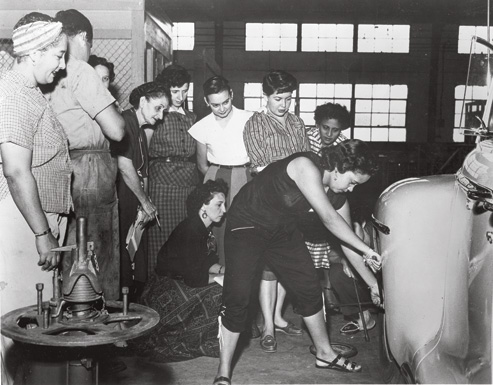 |
Sorting Rich History
By Sarah Gauché ’08
On the far edge of campus, down a flight of stairs, through a dark concrete hallway,
visitors must ring a doorbell to be admitted to a well-lit room. There tables are
covered in boxes of photographs, articles and administrative records documenting
some 150 years of the work of the Young Women’s Christian Association (YWCA)
of the U.S.A. The 800 boxes of comprehensive yet unorganized historical records,
temporarily located in the basement of Smith College’s Physical Plant building,
are the largest body of archives in the Sophia Smith Collection.
In May 2004, the National Historical Publications and Records Commission of the National
Archives awarded the Sophia Smith Collection an $182,000 grant to process the YWCA
archives, the bulk of which have been at Smith since 2002. The aim of the grant was
to create a coherent arrangement for and comprehensive lists of the contents of the
archives so they could eventually be accessible to the public. One year into the
two-year process, the project is moving forward, as Kara McClurken, project archivist,
and Maida Goodwin, assistant project archivist, along with the help of a few assistants,
diligently put together the pieces of the YWCA’s rich history.
The YWCA movement was introduced in the United States in 1858 and was officially
incorporated in 1907 as chapters began to spring up nationwide. Showing deep commitment
to racial and ethnic minorities, immigrants, and working-class women, the YWCA has
provided almost 150 years of service, addressing a host of needs while advocating
for voting rights, civil rights and women’s rights. A recent YWCA annual report
notes that the organization’s “dual commitments to the personal growth
of women and the creation of a just society have involved hundreds of thousands of
women and spanned more than a century.”

Among the treasures stored in 800 archival boxes are myriad photos and posters documenting
YWCA activities over 150 years, including (above) an auto mechanics class in San
Juan, Puerto Rico, YWCA, undated; (below left) a promotion for health and fitness;
and (below right) the club YWCA Girl Reserves in Evanston, Illinois, 1944 (Arthur
C. Allen, Stadler Studios). Images courtesy Sophia Smith Collection.
When the YWCA
decided it could no longer maintain its archives, it turned to the Sophia Smith
Collection (SSC), recognizing the importance of the collection and the staff’s archiving abilities.
Securing the collection was only part of the process. The hundreds of boxes of unorganized
material loomed large. McClurken recalls that in the first steps of the process, “We
just had to get a sense of what was in the boxes. We began by looking through all
the boxes to simply figure out what was there.” They discovered an overwhelming
amount of material that thoroughly documented a rich history, providing insight into
the structure of the organization.
As they continued to sort through the material, McClurken and Goodwin began to uncover
individual stories of women involved in the organization. “It becomes a sort
of soap opera the further you delve into the archives,” Goodwin comments. “You
meet people and follow them throughout their careers, and sometimes even throughout
their lives.” Both SSC archivists commented that archivists often grow fond
of the people whose lives are documented in the collections. “As you follow
an individual through a lifetime, journeying through successes and failures, when
you reach that person’s death in history, it is almost as if they die again—but
this time, they die as your close friend,” reveals Goodwin.
The sheer size of the collection is only one of the difficulties faced in processing
it; portions of the collection require extensive preservation measures. In addition,
the variety of topics the collection documents and its many possible uses present
a challenge to the SSC staff. In sorting the material into usable categories, McClurken
notes, “The job of an archivist isn’t to digest the information, but
rather to evaluate the information and make it accessible.” The SSC archivists
know that they have done their jobs correctly when they have created a system that
is easy for others to use when researching.
The journey through the extensive YWCA history will continue as the archivists work
to open the material to research sometime in fall 2006. In the meantime, McClurken
and Goodwin continue to assess the materials that will prove to be an important addition
to the Sophia Smith Collection. Goodwin states, “This collection demonstrates
the YWCA’s commitment to helping women lead larger lives, and that is exciting.”
|
 |























